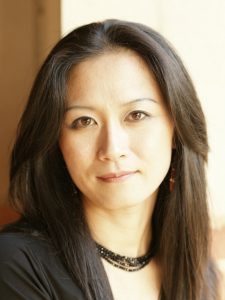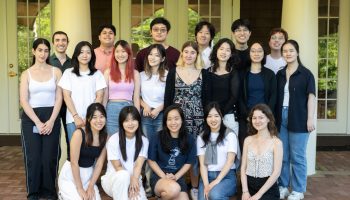

The M&M Piano Duo has something as sweet as their name to offer in their performance this weekend: a program of French music full of dances and delights.
At 4 p.m. Saturday, August 3 in Elizabeth S. Lenna Hall, as part of the Chautauqua Chamber Music Resident Artist Series, School of Music faculty members Martin Dubé and Kanae Matsumoto will perform a recital of piano duets, some for two pianos and some for four-hand playing, the latter of which they will play together on the same piano.
The name Dubé and Matsumoto gave themselves, the M&M Piano Duo, is both a combination of their names (Martin and Matsumoto) and a tribute to Marlena Malas, the chair of the Voice Program who is on leave this summer, and to whom they credit their presence at Chautauqua.
“Without her we (would not be) here,” Matsumoto said. “We owe her a lot: how we listen to music, how we feel music, how we listen to each other, how we love each other. … She is a very important person in our lives.”
The recital will begin with Francis Poulenc’s Sonata for Piano Four Hands, a relatively straightforward piece meant to sound childlike and sweet. As it was originally written as part of the salon music tradition and meant to be performed for only a parlor room full of guests, Dubé and Matsumoto face the challenge of keeping that intimate sound while magnifying it for the concert hall.
“It is the simplest music,” Dubé said. “Not necessarily the most easy, but it’s not profound music at all. … It’s almost like little rhymes.”
This will be followed by Claude Debussy’s “Petite Suite,” also for four hands, which is made up of four smaller movements: “En Bateau” (On a Boat), “Cortège” (Procession), “Menuet” (Minuet) and “Ballet.”
“It’s such a delicate, pleasant, playful (piece),” Matsumoto said. “(Like) French dessert.”
Next, the program will return to Poulenc, as Dubé and Matsumoto play his Sonata for Two Pianos. Written in the post-war turmoil of early 1950s France, the piece makes use of conflict between the pianos to paint a portrait of the world at that time. It is the most solemn piece on the program, and a particular favorite of Dubé’s.
“(It’s) very humorous, but it can be so profound and so touching, and these harmonies really get me a lot,” Dubé said.
The two will take on a hefty piece for the finale of the recital: Maurice Ravel’s “La Valse” (The Waltz). If Debussy’s “Petite Suite” is dessert, then this piece is the main course. Originally written for a full orchestra, this version distills all the color and complexity of dozens of instruments into just two pianos.
“It’s really the pièce de résistance of the show,” Dubé said. “It’s a big shebang; it’s great. I hope we play it so well that everyone is going to waltz leaving the hall.”
The piece begins chaotically, like a ballroom full of people, before the melody of the waltz emerges. Throughout, the music is meant to evoke the imagery of a big dance at a ball.
“Lights coming in, people swirling, some people having a little affair in the corner of the room — you just use your imagination,” Matsumoto said. “Again, another delight, … just the fact that we are playing it — oh my God, ooh-la-la.”
It will be Dubé and Matsumoto’s first time playing in concert together. In many cases, pianists playing duets together for the first time can struggle to adjust to each other’s styles and musical understandings, but Dubé and Matsumoto have found that they have meshed together easily. Part of this, they agreed, likely comes from their experience as vocal coaches. They are trained to listen closely to the vocalists and change their playing to accommodate the singer’s performance; so, when playing with each other, they know how to listen and follow each other’s lead.
“Sometimes I have the illusion of — we’re playing together, but it’s as if I’m playing alone,” Matsumoto said. “Because it’s so inclusive, because we’re so in sync, I don’t feel like we’re two separate entities.”
Though the program covers a range of emotions from humor and wit, to anger and sorrow, Dubé and Matsumoto are mostly excited to have fun with it.
“There are some moments of serious music, but that’s not what I want to hear from (the audience), like, ‘Oh my God, that was so touching,’ ” Dubé said. “I want them to say, ‘Oh my God, you guys were having a blast there.’ ”




